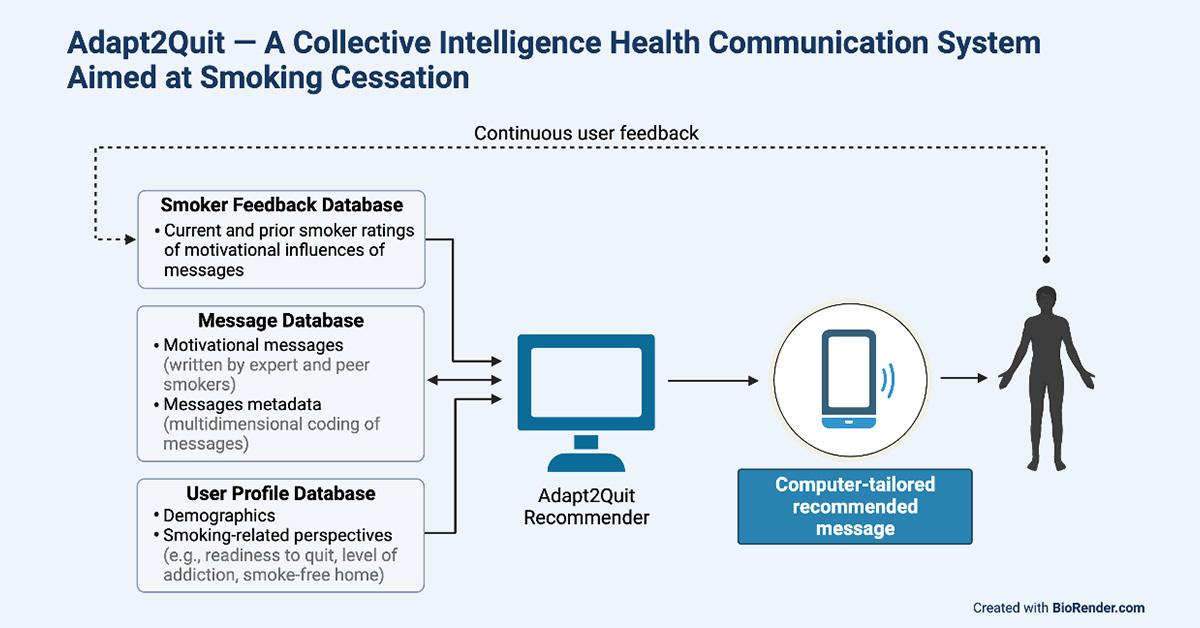
Smoking cessation is one of the most important interventions to prevent lung cancer. Anti-tobacco public health campaigns over the past 50 years have managed to successfully reduce the prevalence of cigarette smoking in the United States.
However, despite this decline, smoking still remains the leading cause of preventable death — increasing the risk of lung cancer and killing more than 480,000 Americans every year.
The benefits of these public health campaigns have not been uniformly distributed and smoking-related disparities have expanded. In particular, individuals who are socioeconomically disadvantaged have the highest smoking rates in the country and disproportionately suffer from diseases caused by smoking. Yet, they are also more difficult to engage for participation in smoking interventions.
Rajani Sadasivam, PhD, is working to address these smoking-related disparities using digital technology. Dr. Sadasivam is an associate professor in the Department of Population and Quantitative Health Sciences at the UMass Chan Medical School and a member of the UMass Cancer Center. His combined expertise in computer engineering and health care research has enabled his work in creating innovative technology-based methods for increasing the effectiveness of health communication programs. Dr. Sadasivam recently developed a new computer-tailored health communication system aimed at smoking cessation, named Adapt2Quit, and is leading a randomized control clinical trial to test the effectiveness of this new system with socioeconomically disadvantaged individuals who smoke.
Computer-tailored health communication refers to the use of computer programs to select specific content for an individual that is designed to change their behavior. There are different ways to design and implement effective computer-tailored health communication; the use of machine learning computer algorithms in Adapt2Quit, which learn and adapt to continuous user feedback data, is one of the more advanced ways. Adapt2Quit uses information about the individual's personal characteristics and their continuous feedback to the system, such as their ratings of how influential a given text message might be in helping them to quit smoking. It also uses data from thousands of prior smokers' profiles and their patterns of feedback to the system. Essentially, Adapt2Quit continuously learns from participants’ feedback, which it then uses to enhance the personal relevance of the text messages and, ultimately, to improve the engagement of participants in the smoking intervention. In this way, Adapt2Quit is an adaptive system that uses the collective intelligence of the individual and the group to personalize the communication to the individual.
In the Adapt2Quit clinical trial, the primary question that Dr. Sadasivam hopes to answer is whether the Adapt2Quit tailored messages will be more effective for smoking cessation among socioeconomically disadvantaged smokers than a best-practice text messaging approach facilitating access to Quitlines (a phone-based public health resource offering counseling and nicotine replacement therapy to smokers that is available in all 50 states in the United States and in many other parts of the world). To answer this question, the study will compare two groups of socioeconomically disadvantaged participants who smoke: one group (the experimental group) receives motivational Adapt2Quit text messages, in addition to messages aimed at facilitating access to Quitlines, while another group (the active control group) only receives the text messages connecting them to Quitlines. In either group, participants have to respond and agree in order to be connected to Quitlines. After 6 months, participants from both groups will report whether they have successfully quit smoking. To confirm this in a more objective way, the study will also biochemically verify smoking cessation by measuring the levels of carbon monoxide in participants exhaled air.

The collective intelligence technology used by Adapt2Quit is widely used by companies like Amazon and Netflix to continuously learn from user feedback (such as products purchased or programs watched) and personalize the customer experience. Adapt2Quit is the first computer-tailored health messaging system to use this technology. "Computer-tailored health communication is a widely used technique to support behavior change and can reach large populations using technology such as texting or emails", says Dr. Sadasivam. "Our goal is to see if strategies that have been effective in other industries to personalize the user experience can be applied to computer-tailored health communication. With mobile phone ownership now being near universal, including among socioeconomically disadvantaged people, text messaging from the Adapt2Quit collective intelligence system has the potential to reach large, broad populations for individualized smoking cessation support. If we can increase the effectiveness of this communication, we can create a big impact".
The findings from the Adapt2Quit clinical trial may not only help researchers and clinicians understand how to best engage socioeconomically disadvantaged groups to participate in smoking interventions, but can also be applied in other types of personalized interventions to elicit healthy behavior changes.
Dr. Sadasivam’s research in Adapt2Quit is funded by a grant from the National Cancer Institute. The clinical trial, which aims to start recruiting this month and anticipates 900 participants, will take place at UMass Chan Medical School, Baystate Health, and Johns Hopkins University. The trial is sponsored by the UMass Chan Medical School.